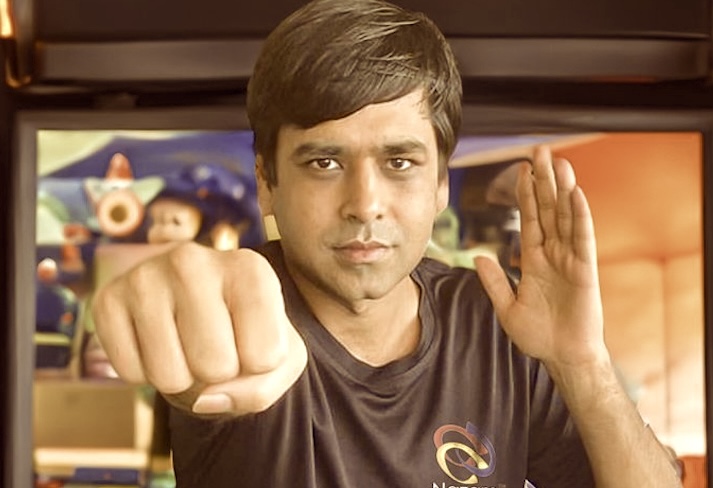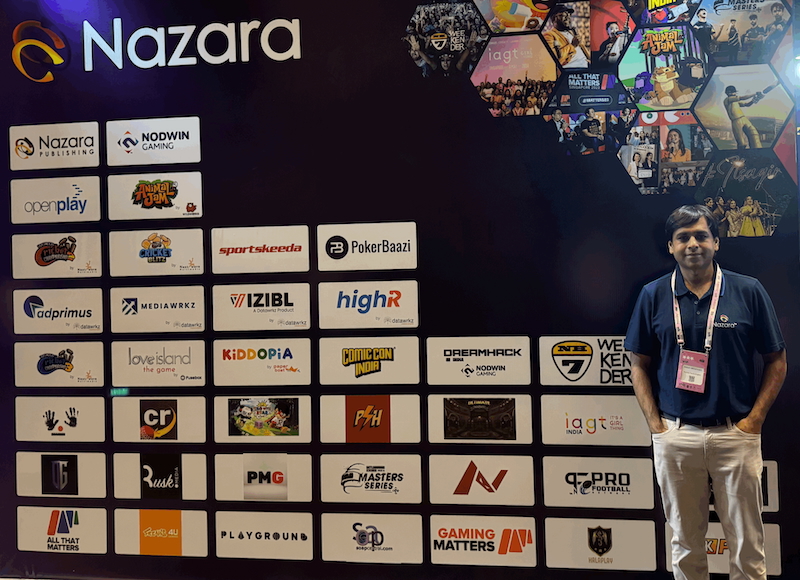It’s game to go global. In fact that’s the only game it looks like it is willing to play. Nazara Technologies, under the leadership of CEO Nitish Mittersain, is charting an ambitious course to become a global gaming powerhouse built from India. One would find it hard to believe that Nitish is anything more than 35 years of age, he carries oodles of boyish charm with him everywhere. (He’s actually 45). The boyish looking executive who’s grown Nazara from a bedroom operation to one of the most impressive gaming and experiences companies to emerge from India.
Hailing from a business family, Mittersain began coding at the age of eight, had tech pioneer and actor Shammi Kapoor as a mentor, set up a website building business when he was just 15. Nazara followed when he was 19. It nearly went belly up with the dot com bust with huge debts piled up; its saving grace was that it had a relationship with cricket’s God Sachin Tendulkar. Hence it managed to attract investment from Westbridge Capital.
Since then there’s been no looking back. A massive IPO has seen the company raise capital, followed by acquisitions galore – both in India and overseas as Mittersain goes about his business building a group touching various aspects of the gaming ecosystem and one which can rival other scaled enterprises globally.
Nazara’s latest quarter financials saw a bunch of investors, analysts probing him during an investor call to check if the company’s story still holds merit. He parried all with extreme ease, grace and aplomb.
Indiantelevision.com decided to paraphrase Mittersain’s responses during the investor call, to give you insights into how this young gaming entrepreneur is single mindedly cobbling together a global Indian gaming enterprise. Excerpts:
On Nazara’s great Q3 FY2025 performance.
Our Q3FY25 performance demonstrates the strength of our diversified portfolio. Revenue reached Rs 534.7 crore, representing 67 per cent year-on-year growth, while EBITDA grew 39 per cent to Rs 52.4 crore. The core gaming segment was particularly strong, growing 53 per cent year-on-year, driven by our Fusebox Games acquisition and solid performance from existing titles like Animal Jam.
For the first nine months of FY25, we've reported revenue of Rs 1,103.7 crore and EBITDA of Rs 102.4 crore, showing consistent growth across our business segments. Gaming contributed 29 per cent of total revenues and 56 per cent of EBITDA in Q3, while eSports delivered 43 per cent of revenues and 32 per cent of EBITDA. This balance demonstrates the resilience of our business model and the success of our diversification strategy.
On the strategic thinking behind the recent capital raises through preferential placement that the company has resorted to recently.
The Rs 495 crore raised through preferential placement to Aksana Estates LLP represents more than just capital – it's a strategic partnership that validates our vision. Having established entrepreneurs like Arpit Khandelwal and Mithun Sacheti, the founder of CaratLane, join us as co-promoters brings valuable expertise to our growth journey and provides us with substantial financial flexibility. Having Plutus Wealth and Mithun Sacheti cross the 25 per cent threshold and join as co-promoters is a significant validation of our business model.
While some investors might view dilution with concern, we're seeing unique opportunities in the global gaming market. The current environment, characterized by post-COVID normalization and higher interest rates, has created situations where high-quality assets are available at attractive valuations. Our strategy isn't about short-term arbitrage – we're building a sustainable global gaming company by acquiring strong assets and growing them systematically.

On how the company evaluates potential acquisitions, particularly in terms of IP valuation
We look at multiple factors. First, we assess the historical performance – app store ratings, download numbers, current user base, revenue trends, and profitability. Second, we evaluate growth potential under Nazara's ownership – can we expand the business through improved live operations or market reach? Finally, we consider valuation metrics, typically based on EBITDA multiples within our acceptable range. For instance, with our recent game acquisitions from Zepto Labs, we saw strong existing performance metrics combined with clear opportunities for growth under our management.
On the company’s IP licensing strategy, particularly with brands like Barbie and Big Brother.
Our IP strategy represents a shift from our traditional approach of relying solely on original content. We've observed that popular IPs can significantly reduce user acquisition costs through organic downloads and improved click-through rates. These partnerships, such as Kiddopia's agreements with Mattel for Barbie and Moonbug Entertainment for Little Angel, typically involve minimum guarantees plus revenue sharing arrangements. Even with these costs, we expect better profitability compared to traditional user acquisition spending. The success of Fusebox's Love Island game has given us confidence to pursue similar partnerships with Big Brother globally and Bigg Boss in India.
On how Nodwin Gaming is performing, and what's the path to profitability
Nodwin continues to build market leadership in eSports and youth engagement. Their Q3 revenue grew 23 per cent year-on-year, but the like-for-like growth was actually 48 per cent excluding Wings, which was deconsolidated. While profitability has been impacted by strategic investments and events like the NH7 Weekender cancellation, we're seeing strong performance from proprietary IPs and live events. Nodwin has expanded its footprint to 20 countries and made strategic acquisitions in influencer management (Trinity Gaming), content distribution (AKF Gaming) and event production (StarLadder). Their international revenues now account for 48 per cent of total revenue, demonstrating successful global expansion.
We're deliberately prioritising growth over immediate profitability because we believe building market leadership and strong moats now will create significant value in the future. The youth attention economy, particularly in emerging markets, represents a massive opportunity that requires scale and presence to capture effectively.
On PokerBaazi, and its growth trajectory
PokerBaazi is the dominant poker platform in India, and our strategy is focused on building an even stronger moat through brand development. Their gross gaming revenue grew 67 per cent year-on-year in Q3, with healthy growth in both traded value and deposits. Rather than focusing on performance marketing, they're investing heavily in brand building through strategic sponsorships like Shark Tank and IPL. The core business is very profitable – quarterly EBITDA fluctuations mainly reflect the timing of brand spending. This approach should create a more defensible market position over time.
On the approach while developing games - both in India and internationally
We're implementing a hybrid model that leverages global expertise with Indian capabilities. Take Fusebox Games for example – their core team of about 35 people in the UK drives game design and narrative, while we're increasingly shifting development and engineering work to India. This allows us to combine international design expertise with India's strong engineering talent pool.
Through Nazara Publishing, we're also bringing international games to the Indian market, providing localised support and marketing. This aligns with our view that India's gaming market will see significant growth in terms of paying users over the next five years. Simultaneously, we're investing in local studios and capabilities to create games in India for the global market, responding to the government's vision of India as a gaming development hub.

On the company’s G-commerce initiative and its potential impact
G-commerce addresses a fundamental challenge in the Indian gaming market – low monetisation through both in-app purchases and advertising. By integrating e-commerce within gaming environments, we aim to create new revenue streams through affiliate fees. We're in advanced stages of a pilot with ONDC, scheduled for launch in Q4FY25. If successful, this could be a significant innovation not just for India but globally. The concept leverages Indians' familiarity with online shopping while providing game developers with better monetisation options than traditional advertising.
On challenges post Apple’s IDFA changes and how Nazara addressing them.
The post-IDFA environment has certainly changed the landscape for user acquisition. We're adapting through multiple strategies. First, our IP partnerships help generate organic downloads and reduce acquisition costs. Second, we're seeing ad agencies and platforms develop new models that work within the privacy-first framework. Third, we're exploring alternative channels and focusing on markets where Android remains dominant. The situation has stabilised over the past 18 months, and we're seeing companies, including ourselves, successfully adapt their user acquisition strategies to this new reality.
On the role AI will play in Nazara's future operations
We see AI as both an opportunity and a tool across our business. In game development, we're exploring AI applications for content creation, testing, and personalization. In user acquisition, AI helps optimize targeting and spending. For eSports, AI assists in content creation and production efficiency.
However, we maintain a balanced view. While AI can enhance efficiency and create new possibilities, the core of gaming remains human creativity and engagement. We're focused on using AI to augment rather than replace human capabilities, particularly in areas like game design and community engagement.
The real opportunity lies in using AI to better understand and serve our users while maintaining the human elements that make games and eSports engaging. We're investing in AI capabilities but always with a clear focus on enhancing rather than replacing the core gaming experience.
On guidance for future growth
We're maintaining our FY27 EBITDA target of Rs 300 crores and are confident in achieving it. Our recent capital raise and strong cash position give us the flexibility to pursue both organic and inorganic growth opportunities. 2025 presents particularly attractive M&A opportunities in the global gaming market, especially given current valuations. We're seeing potential in both established markets and emerging economies, particularly in mobile gaming and eSports. Our focus remains on building a truly global gaming company from India, leveraging our expertise across different segments and geographies.
(Picture of Nitish punching courtesy INC42)
 Follow Us
Follow Us





